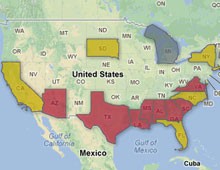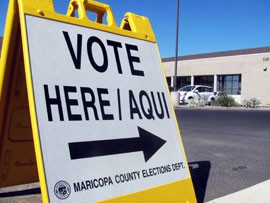Cronkite News has moved to a new home at cronkitenews.azpbs.org. Use this site to search archives from 2011 to May 2015. You can search the new site for current stories.
Voting Rights Act changes would keep Arizona free of federal ‘pre-clearance’
WASHINGTON – The rewrite of the Voting Rights Act currently being debated in Congress would free Arizona from nearly 50 years of strict federal oversight to changes in its voting laws.
The rewrite comes after the Supreme Court last summer struck a key provision of the 1965 act that required some or all of 15 states – including the entire state of Arizona – to get Department of Justice “pre-clearance” of any changes to their voting laws because those states had a history of discrimination.
Under legislation currently being considered in the House and Senate, only four Southern states would still need pre-clearance for voting law changes. Other states could be pulled back under federal pre-clearance, but only if they established a new record of voting discrimination violations.
Advocates on both sides of the issue were cautious about the change and were taking a wait-and-see approach.
“It was an outdated method,” said Ilya Shapiro, a senior fellow at the Cato Institute. He called the old provision a “relic of the Jim Crow era” that Arizona needed to be freed from.
“Arizona has not had any violations in decades and has no reason to require that kind of federal oversight anymore,” Shapiro said.
While Arizona and other states will be out from under the federal microscope for now, the proposed change to the law would let them be drawn back in, said Rep. Sheila Jackson Lee, D-Texas, a co-sponsor of the House bill. And, she noted, it could also make states that were not subject to review before come under federal review, if they commit voting rights violations.
“This bill opens up review to more states beyond Arizona,” Jackson Lee said recently. “You can grow into it. Even states that have no history of voting violations like Ohio will be treated the same.”
An overview of the Voting Rights Amendment Act of 2014 from Sen. Patrick Leahy, D-Vt., and a co-sponsor of the Senate bill, said it would allow courts to “bail in” states that committed five voting rights violations over 15 years, one of which was committed by the state itself.
For jurisdictions within a state, the bail-in option could kick in after three violations in 15 years or just one violation in a jurisdiction that has had “persistent and extremely low minority voter turnout.”
States or local governments would be subject to the review for 10 years, in general, once they were bailed in.
But while it offers some protections, a spokesman for the Arizona Advocacy Network said he worries about what it leaves out. Sam Wercinski is concerned that the bill would not count a voter photo ID law as a state voting rights violation.
“They allow photo ID because they cannot see the harm,” said Wercinski. “Arizona doesn’t have a fraud problem, but these photo ID laws are making it difficult to vote for communities of color, new American citizens, young voters, the elderly, and the homebound.”
But Shapiro points out that the bill gives a lot of attention to minority turnout.
“It gives protections to non-white voters by having the state make sure they keep the same voting levels,” Shapiro said. “I have never seen anything like that before.”
The bills were introduced in January and referred to the respective judiciary committees of the House and Senate, but no hearings have been held. Jackson Lee said there is no timetable for them to move forward, but she is confident that the measures will pass with bipartisan support.
“If it was on the floor being voted on by the August recess, I would be very happy,” she said.








